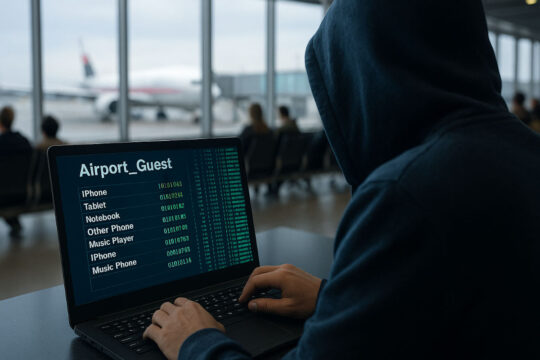TSA’s new travel warning: Don’t fall for ‘Free Airport Wi-Fi’

You know the drill: You hit the airport, find a seat near your gate, and your first thought is, Where’s the free Wi-Fi? You see a network called “Free Airport Wi-Fi” or “Airport_Guest” and think, Perfect.
The TSA says: Stop right there. Their latest warning is the digital equivalent of “Don’t take candy from strangers.” Public Wi-Fi, especially in airports, is a hacker’s playground.
💻 The fake network trap
Cybercriminals love high-traffic spots like airports. They’ll set up a “rogue hot spot,” a network that looks official but isn’t. They’ll copy the airport’s naming style, right down to the capitalization, so “Airport_Guest” and “AirPort_Guest” look the same at a glance.
Signs it’s fake:
- No password prompt, or a password that’s posted on a random sign or piece of paper instead of an official screen.
- It’s not listed on the airport’s website or information desks.
- The signal strength seems “too good,” no matter where you are in the terminal.
Once you connect, every password, message and email you send can be intercepted and stolen. You’ll never know it’s happening.
🔌 Juice jacking: The charging port scam
The TSA’s warning isn’t just about Wi-Fi. Those free USB charging ports in terminals can be just as dangerous. Juice jacking happens when a hacker loads malware onto a public charging station. Plug in your phone or laptop, and in seconds they can:
- Install spyware and malware.
- Steal your contacts, files and photos.
- Grab saved logins without you clicking a thing.
If you must use airport charging, always pack a USB data blocker ($9.89 for two) or bring your own wall adapter.
With summer travel numbers at record highs, the timing is no accident.
More people flying means more potential victims. And the bad guys? They’re counting on you to think, Eh, it won’t happen to me.
🔓 My travel rule: Always encrypt
If I’m connecting to any public Wi-Fi, I’m running a VPN. Period. A VPN encrypts your connection, so even if you land on a hacker’s fake network, your data looks gibberish.
No one can read your messages, grab your banking logins or spy on your browsing.
My pick? ExpressVPN. It’s fast (even on hotel Wi-Fi), dead-simple to use and has servers in nearly 100 countries. I’ve tested it while traveling, and it’s the difference between leaving your front door wide open or locking it with a deadbolt.
Before your next trip, whether it’s a quick hop or a big vacation, install it. The TSA can warn you all day, but it’s on you to make sure your digital life stays yours.
✅ Click here to get 4 months free on a one-year plan. Comes with a 30-day money-back guarantee, too.
We may earn a commission from purchases, but our recommendations are always objective.
Tags: airports, cybercriminals, malware, network, Wi-Fi
